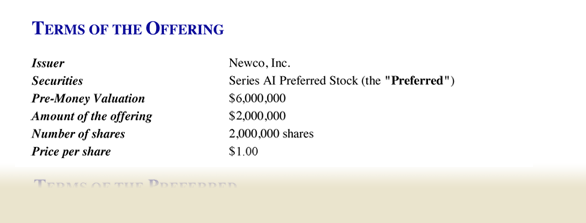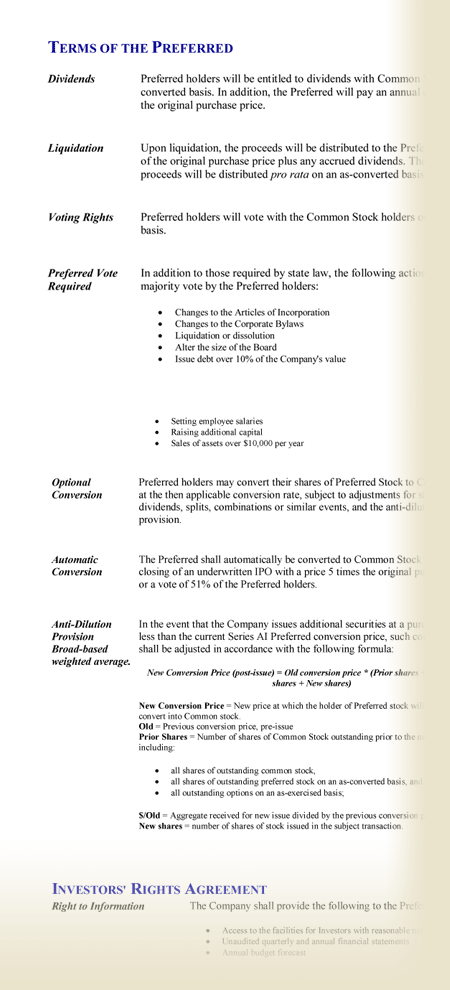
|
Authored by Bryan Springmeyer Bryan Springmeyer is a California corporate attorney who represents startup companies and investors. The information on this page should not be construed as legal advice. |
Term Sheet for Seed/Angel Investment
The instrument for a seed stage investment in tech startups is usually a convertible note, preferred stock, or convertible securities like the YC-SAFE. Although the SAFE has become pretty commonly used, we still see convertible notes used on most seed financings under $2 million. [See: Convertible Note Term Sheets] Preferred Stock is usually only used on larger deals, because the amount of negotiation and customizing transaction documents makes the instrument much more expensive to use. Convertible notes and convertible securities are relatively cheaper because they defer most of these negotiations to a later stage, namely the next investment that converts those instruments to equity. This article discusses the term sheet for the minority of seed financing deals done with Preferred Stock.
Who Issues the Term Sheet?
If VCs or angels that operate like VCs are involved, they will likely issue the term sheet. With a more diverse investor base, it could be the company that issues the term sheet to coordinate the round.
Seed financings using Preferred Stock are often thinned down versions of regular Series A documents, summarized by terms such as the following:
1. The offering
 |
Image of document created with the Angel Terms seed round preferred stock term sheet generator |
Once a pre-money valuation is calculated, an amount of stock or ownership interest that reflects the valuation is offered for the amount of capital required and/or the amount of money the investor wants to invest. This figure is usually reflected as a maximum (i.e. "up to an aggregate amount of"). Sometimes there are minimums or a fixed amount.
2. Terms of the Securities - Changes to the Charter

A. Dividend - The series of Preferred Stock (e.g., Series Seed) may entail a dividend payment. With Preferred Stock, which is the instrument used for venture capital transactions, the investors might want a fixed dividend payment for their series of stock in addition to the dividends paid to Common Stock holders. This way, they receive a fixed dollar or percentage amount for their contribution, regardless of whether the company is profitable, assuming they don't become insolvent. Usually, however, these dividends don't become payable until a liquidation event or upon the declaration of dividends for the Common Stock.
B. Liquidation - Typically, upon liquidation, the investors will want to receive the return of their full investment amount prior to other deal proceeds being distributed. After this "liquidation preference" is repaid, the rest of the assets are distributed on a pro rata basis as if the Preferred Stock had been converted to Common Stock. There could be a liquidation preference in excess of the initial amount of investment (i.e. “2X liquidation preference”), but this might be less common in a seed stage deal.
C. Voting Rights (Shareholders) - Most Preferred Stock will vote with the Common Stock as a single pool for votes to be made by the Common. In addition, there may be class votes on certain actions for protection of the investors. This could also be dealt with by Board placement, requiring unanimous/specified Director approval on decisions that could potentially devalue the investors' stock. Note that state and federal laws will also require class approvals on certain actions. Voting agreements are usually entered into to ensure the agreed-upon composition of the Board (see Board Composition, below).
D. Conversion - The conversion rights of Preferred Stock that are used in VC transactions give investors a good deal of protection. They can recoup their investment from a company that was only successful enough to liquidate at the amount of investment proceeds, but can convert to Common Stock if it is more successful. The terms of conversion usually provide for an optional conversion right, which may allow the investor to convert to equity within a given time frame or subject to some other restriction. Very often, the terms allow optional conversion at any time. Mandatory conversion terms might be set for IPO's or majority votes to ensure the Preferred class can be retired when they get paid.
E. Anti-Dilution Provisions - Dilution occurs when a company decides to issue additional stock. If the new valuation is less than the valuation at the time of the initial investor's contribution, they lose value. Anti-dilution provisions readjust the conversion price, allowing them to convert their Preferred Stock to more Common Stock than initially set, to ensure their investment is not unfairly devalued. Broad based weighted average is the standard anti-dilution protection.
F. Redemption Rights - This provision may not be included in seed round financing, because it could be detrimental to a marginally successful startup. Redemption rights provide the power to trigger a redemption call. During the call, the company must buy back the Preferred Stock pursuant to the terms established. This can be good for investors who want to liquidate their interest and get out of the investment. It could also be good for founders who want to retire the Series of stock.
3. Investor's Rights Agreement
Many of the terms I listed in the section above work for the benefit and protection of the investors and could rightfully be included in this section. However, the terms that may be included specifically in this section are the following:
A. Right to future rounds - This term allows investors to participate in future equity rounds on a pro rata basis. If for instance, an angel provides $250,000 representing a 10% equity stake at the seed round, the company increases in value, and makes a new offering based on a valuation of $10 million, the investor could purchase 10% of the new securities being offered in that round. This allows investors to maintain their proportional ownership.
B. Right to information - This term allows investors to access the premises and information of the company. Terms might include a right to enter and inspect the premises with reasonable notification, quarterly and annual financial statements, and budget forecasts.
C. Board Composition – Seed stage Preferred Stock investors don’t always demand a seat on the Board. However, it is more common than not to have some Board representation. A common composition is one Director voted in by the Preferred Stock and two voted in by the Common Stock. Sometimes the third is appointed by the CEO or selected by consensus.
D. Registration Rights - Investors will often ask for registration rights. This means that the company agrees to register the securities with the SEC to allow the investors to resell them. Registration rights typically come in two varieties, demand and piggy-back. The demand rights require the company to register the public offering at the investor's demand. Piggy-back rights allow investors to tack their registration onto the company's public offering, when and if they make one. This term is premature for a pre-Series A financing and is usually not included.
